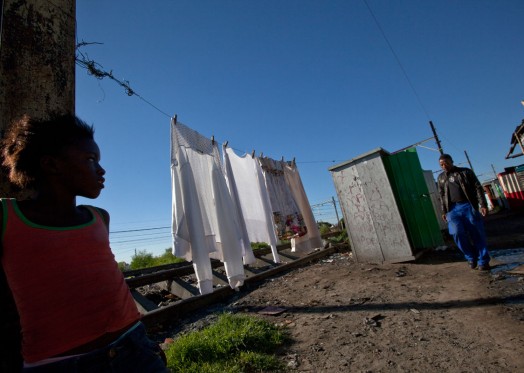Mandela’s kids

Apartheid is a state of mind. I spent a week in a township on the Cape Flats and never spotted a white person around, not even a coloured. Self-segregation is firmly in place. Whites drive fast on the freeways cutting through the endless lines of tin/plastic shacks without stopping. After dark no outsider dares to roam the dirt and volatile narrow alleys of Crossroads, Guguletu or Mitchell’s Plain; althought it is at times more risky walking at night in the back streets leading to the plush Cape Town Waterfront, where angolan and zimbabwean immigrants stalk the tourists for money, occasionally stabbing them. I felt comfortable in Philippi and Khayelitsha, two of the biggest and most troubled black townships in the Western Cape. I wasn’t alone, of course. I was with Odwa, shack dweller, hip hop musician, youth organizer, and Tando, a social worker and part time soprano singer (yes! she lives in Philippi and she can sing “The Queen of the Night” aria from Mozart’s Zauberflöte)
We sank into no-go areas like “Cosovo”, the poorest and most derelict section in Philippi: shacks barely standing along the metro-railway tracks, tin roofs with rocks on top, no-light-no-water-no-toilets-no-jobs environment, 30 to 40 per cent HIV and TB infection rate. It’s crowded: some have to sleep in shifts. I had a long chat with Nonkanyiso: she is HIV positive and passed on the virus to her 12 years old son Thamsanqa. “This is hell” she says. At 14 young boys join the gangs, sniff gasoline and smoke “tic”, a cheap and brain burning home made metamphetamine by-product. Some even smoke rat poison. Girls sell sex to “sugar dads”: it’s no prostitution, they claim, it’s survival. Millions of condoms are distributed, but nobody uses them in the townships.
Nomfundo Pilisani, the wonderful mama who runs the House of Smile, the Cesvi-sponsored shelter for abused women and abandoned children in Philippi, is trying to make a difference. The House is clean, warm and open to anyone in need. But it’s a huge task. “Rapes and sexual abuses are common” she says. “And teenage pregnancy is on the rise: no wonder, since the government is providing 290 rands a month for each child. Women are supposed to stay home and make babies”. One lady I met one night in Khayelitsha has fifteen children: she showed me how to make “umqombothi”, the african beer she illegally brews and sells from her shack. It tastes good and it’s cheap: by 10 pm all the neighbourhood is drunk.
“No one imagined we were going to have a paradise overnight” wrote archibishop Desmond Tutu in yesterday’s Mail&Guardian. “But we imagined that by now we would have made very considerable strides in bridging the gap between the poor and the well off. Yet today South Africa is the most unequal society in the world”.
Housing is a major problem. Urban development has been sped up, new houses are built, but not enough to cope with the constant influx of job seekers from the Eastern Cape and from abroad (Congo, Somalia, Nigeria, Angola, Zimbabwe). Illegal occupation of public soil is met with harsh law enforcement measures. Dozens of destitute squatters have been forcebly evicted by the police: their dwellings pulled down and removed. On Sunday I brought some food to a group whose shacks were destroyed last week. They are determined to stay in the place they now call “Marikana”, after the platinum mine where 44 demonstrators were gunned down by the police in August. Every day they stage a protest, burning tires on the nearby road. They sleep on plastic sheets around a fire: they have nowhere to go.
Everywhere you look in the townships you see young barefoot kids with little brothers and sisters in their arms: the large majority of the population must be under 20 or 25. One out of three or four will be very soon infected with HIV. Eric Goemaere, the MSF doctor who was pivotal in challenging Big Pharma’s ARV drugs policy in early 2000, tells me that boys and girls don’t have the peception of risk: “HIV is for them just another and less visible danger. They know they won’t live long. They know they will soon die anyway, either killed in a shoot out, in a car accident or taken by a lethal overdose. And if life is short you want to enjoy it, drink beers, drive fast, smoke dagga and have no-condom sex with as many partners as you can”.
Most of the boys and girls I meet were born after 1990, the year Mandela was released from prison. But these kids don’t care about Mandela and his long walk to freedom; they don’t care about the past. They only care about here and now. And here and now they feel they are still in prison.





